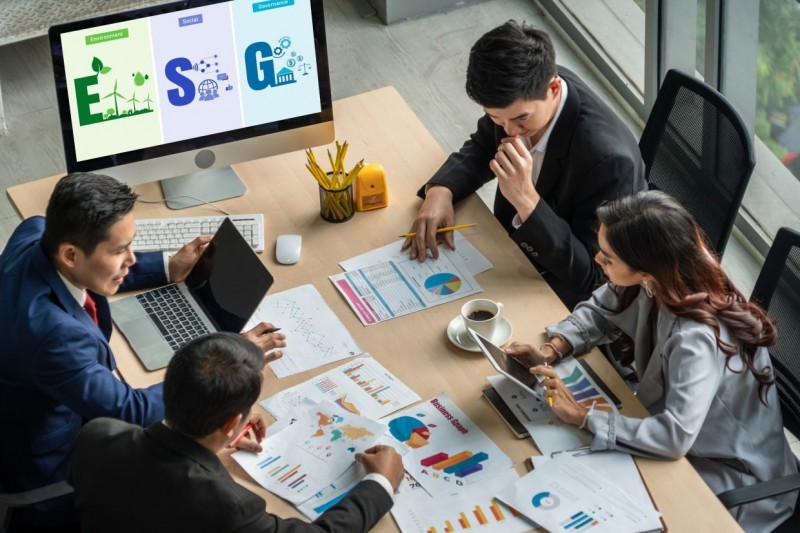
Image credit: The Star
THERE is another year – and – a - half before the EU’s Carbon Border Adjustment Mechanism (CBAM), a policy instrument that imposes a tariff on goods imported to the 27 member bloc based on the amount of carbon emissions from the production process, is fully implemented.
It is unclear whether Malaysian SMEs are ready to comply with the reporting standards or whether they need to spend more on compliance as well as invest in environmentally friendly production processes.
The CBAM provides a level playing field for EU producers, who are required to comply with internal regulations on carbon emissions, by pricing these emissions created during import manufacturing processes.
During the transitional phase from October 2023 to end 2025, the CBAM will apply to cement, iron, steel, aluminium, fertilisers, electricity and hydrogen, which are carbon - intensive and pose a significant risk of carbon leakage, a practice where businesses move production to countries with fewer carbon emission regulations.
According to Julia Goh, a senior economist with UOB Bank (M) Bhd, most Malaysian companies are still in the early stages of ESG adoption.
Nevertheless, she believes most exporters to the EU would have been informed of the new standards by their EU counterparts, since the CBAM imposes additional reporting requirements. Because SMEs contribute 38% of the country’s GDP and 14% of exports are from them, Goh says the matter is serious and that steps are being taken to raise awareness on these requirements.
From next year, only the EU reporting standard under the CBAM will be accepted. There are concerns that Malaysian businesses, including SMEs, may not be quite ready despite government support to accelerate their transition towards a green economy.
Malaysia’s Joint Committee on Climate Change only launched an ESG portal specifically tailored for SMEs last October. Interestingly, Alliance Bank Malaysia Bhd published a report that showed that while 59% of these SMEs have implemented or are exploring ESG practices on their own terms, only 14% of SMEs have heard of ESG.
Taking the insights from SMEs even further, Alliance Bank’s report revealed that 12% of SMEs have ESG practices integrated into their business strategy/operations, and another 16% practice ESG on an ad - hoc basis or on a small scale as it is not fully integrated.
Another 31% are exploring ESG frameworks, goals or initiatives. What is most concerning is the 41% of SMEs that do not consider ESG in their operations. While they are unlikely exporters, they may be embedded into the supply chain or value chain of companies that do. This may have consequences for exporters.
According to Tan Sri Datuk Soh Thian Lai, president of the Federation of Malaysian Manufacturers (FMM), CBAM has a significant compliance cost for large companies exporting to the EU, particularly those that manufacture products that emit carbon dioxide. In addition to this, it will also have a significant impact on the supply chain of SMEs supporting these exporters.
“These SMEs will face increased scrutiny and requirements from their customers to reduce carbon emissions and meet sustainability standards,” he says.
Soh notes that while some SMEs may have the resources and capabilities to adapt to new regulatory requirements, others may need additional support and guidance.
“It is essential for SMEs to proactively assess their carbon footprint, adopt sustainable practices, and implement measures to reduce emissions and seek assistance where necessary,” he says.
He adds that FMM proposed an ESG fund of RM2bil for Budget 2024, but the government introduced incentives and allocations for manufacturers to transition to sustainability and low - carbon economies instead.
Besides that, the Investment, Trade and Industry Ministry is preparing SMEs in the manufacturing sector to adopt ESG practices through the I - ESG Framework.
Capital Markets Malaysia, and SME Corp, an agency under the Ministry of Entrepreneur & Cooperative Development, are also providing ESG transition assistance to small and medium - sized enterprises.
Under Budget 2024, RM230bil was allocated for the sustainability - related development agenda, with RM30bil being fiscal injection from the government and RM200bil being commitments from the private sector. “Hopefully SMEs would take advantage of these facilitations,” Soh says.
Because the CBAM’s scope may expand to include other sectors or industries, Soh is urging the government to push for a free trade agreement between the country and the EU. This will streamline market access and develop much needed capacity - building programmes to help Malaysian companies comply with new EU regulations.
“SMEs form a significant portion of Malaysia’s economic landscape, and their capacity for international trade is crucial for sustainable economic growth,” he says.
SME exports to the EU may not be significant, but the Alliance Bank report notes that mindset change, including on carbon emissions, is still a long way off for SMEs.
Value and importance are not recognised by all, as awareness and adoption are market-driven and industry - specific. Most of them are familiar with the environmental aspects of ESG since they either have to comply by law or are required by their supply chain to do so.
Source: https://www.thestar.com.my/business/business-news/2024/05/27/smes-struggle-with-green-transition

